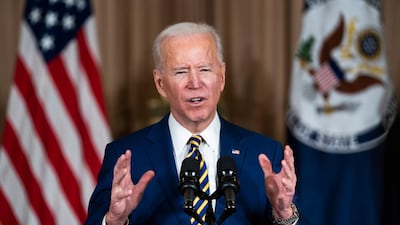President Joe Biden said the US would end support for the Saudi-led military coalition in Yemen fighting the Iran-backed Houthi rebels,
In a speech at the State Department on Thursday, his first on foreign policy, Mr Biden said: "America is back. Diplomacy is back."
National Security Adviser Jake Sullivan spoke earlier at the daily White House briefing before the president met professionals from the foreign and civil service at the State Department.
"We have spoken with senior officials in the UAE and senior officials in Saudi Arabia," Mr Sullivan said.
"We have consulted with them. We are pursuing a policy of no surprises when it comes to these types of actions.
“They understand what is happening and they understand our reasoning and rationale for it.”
It was Mr Biden's first trip to a government agency since taking office.
“He wants to send a clear message that our national security strategy will lead with diplomacy,” Mr Sullivan said, calling State Department employees “the tip of the diplomatic spear”.
The Houthi rebels have controlled much of northern Yemen and the capital Sanaa since 2014, when they drove out the government.
In 2015, the Saudi-led coalition intervened in the conflict, after a request from the government of President Abdrabu Mansur Hadi.
“This war has to end,” Mr Biden said in his address to State Department employees. “We’re ending all American support for offensive operations in the war in Yemen, including relevant arms sales.
“At the same time, Saudi Arabia faces missile attacks, UAV strikes and other threats from Iranian-supplied forces in multiple countries.
"We’re going to continue to help Saudi Arabia defend its sovereignty and its territorial integrity and its people.”
The president asked his Middle East team to "ensure our support for the UN-led initiative to impose a ceasefire, open humanitarian channels and restore long-dormant humanitarian peace talks".
“We’re also stepping up our diplomacy to end the war in Yemen.”
Senior US diplomat and former deputy assistant secretary for Gulf affairs Tim Lenderking will be appointed the US envoy to Yemen, sources told The National on Thursday.
"Tim's diplomacy will be bolstered by USAID working to ensure that humanitarian aid is reaching the Yemeni people who are suffering unendurable devastation," Mr Biden said.
The UAE Minister of State, Dr Anwar Gargash, congratulated Mr Linderking on Twitter.
"Tim's expertise and US engagement will bring new and needed energy and focus to help resolve the conflict and improve stability across the region," Dr Gargash said.
Mr Biden was vice president when the Obama administration backed the Saudi-led intervention in Yemen in 2015, mainly through mid-air refuelling services and intelligence support.
The Trump administration ended the refuelling support in 2018 amid a congressional backlash. But the US continued sharing intelligence with the coalition.
Also during his speech, Mr Biden reaffirmed the need to counter China.
"American leadership must meet this new moment of advancing authoritarianism, including the growing determination of China to rival the United States and the determination of Russia to damage our democracy," he said.
"Leading with diplomacy means standing shoulder to shoulder with our allies. The days of the United States rolling over in the face of Russia's aggressive actions and meddling are over."
He pledged to "impose consequences" on those responsible for what the US regards as a military coup in Myanmar.
“The Burmese military should relinquish the power they have seized, release the activists and officials they have detained, lift the restrictions on telecommunications and refrain from violence,” Mr Biden said.
MIssing from Mr Biden's speech were the Iran nuclear programme, North Korea, Venezuela, Libya and Syria.
Also absent were the wars in Afghanistan and Iraq, and the Palestinian-Israeli conflict.

